 Today Professor Stewart Clegg at UTS, Sidney visited TripleEd and USBE. As part of the activities he gave a talk based on the paper “EMERGENT COORDINATION FAILURES IN FREELANCE IMPROVISATION: LESSONS FROM THE “ROAD OF DEATH”. Unfortunately the paper was so interesting that no photo was taken. The paper is based on a wildfire in Portugal that caught several people at a bad spot, that eventually killed them. The paper is an example of the darkside of improvisation and its consequences.
Today Professor Stewart Clegg at UTS, Sidney visited TripleEd and USBE. As part of the activities he gave a talk based on the paper “EMERGENT COORDINATION FAILURES IN FREELANCE IMPROVISATION: LESSONS FROM THE “ROAD OF DEATH”. Unfortunately the paper was so interesting that no photo was taken. The paper is based on a wildfire in Portugal that caught several people at a bad spot, that eventually killed them. The paper is an example of the darkside of improvisation and its consequences.
Seminar with Professor Ann Cunliffe on “Wayfaring: A Scholarship of Possibilities. Or Let’s not get drunk on abstraction”
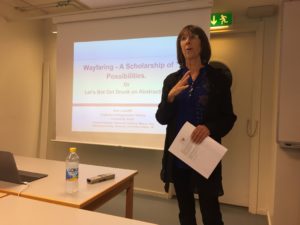 Today Ann gave her second seminar at USBE. This time it was a seminar titled “Wayfaring: A Scholarship of Possibilities. Or Let’s not get drunk on abstraction.” Ann argue that our academic work is becoming increasingly normalized through the gatekeeping activities of journal editors, funding bodies, ranking systems, and so on. This is resulting in a narrowing of scholarship: of methods, of theorizing, and of ways in which we write our accounts. She suggest that one way of addressing this situation is to build a more pluralistic scholarship of possibilities, one that requires us to humanify ourselves and others. Ann draw on anthropologist Tim Ingold’s notion of ‘wayfaring’ as a metaphor for re-thinking how we might conduct our research as a scholarship of possibilities, and suggest this involves foresight, imagination and reflexivity.
Today Ann gave her second seminar at USBE. This time it was a seminar titled “Wayfaring: A Scholarship of Possibilities. Or Let’s not get drunk on abstraction.” Ann argue that our academic work is becoming increasingly normalized through the gatekeeping activities of journal editors, funding bodies, ranking systems, and so on. This is resulting in a narrowing of scholarship: of methods, of theorizing, and of ways in which we write our accounts. She suggest that one way of addressing this situation is to build a more pluralistic scholarship of possibilities, one that requires us to humanify ourselves and others. Ann draw on anthropologist Tim Ingold’s notion of ‘wayfaring’ as a metaphor for re-thinking how we might conduct our research as a scholarship of possibilities, and suggest this involves foresight, imagination and reflexivity.
Quite obviously this topic a very relevant for studying extreme contexts that by definition, is extreme, challenging what is taken for granted.
Track on “ORGANISING FOR RESILIENCE IN EXTREME CONTEXTS” accepted for EURAM 2019
 This track will address a major gap in our understanding – organising for resilience in contexts that are abnormal, exceptional, or extreme. This can involve the processes of anticipating, preparing for, responding to and learning from disruptive events in order to survive and prosper.
This track will address a major gap in our understanding – organising for resilience in contexts that are abnormal, exceptional, or extreme. This can involve the processes of anticipating, preparing for, responding to and learning from disruptive events in order to survive and prosper.
Our specific focus is on in extreme contexts where risks of severe physical, psychological harm or material consequences threaten the viability of an organisation and the safety and well-being of its organisational members. We will explore the theoretical, methodological and practical dimensions of the topic.
Track organizers: Professor David Denyer (Cranfield University); Professor Markus Hällgren (Umeå university); Professor Martina Linnenluecke (Macquarie University); Doctor Elmar Kutsch (Cranfield University); Dr Mark Hall
(Birmingham University); Doctor Hugo Marynissen (Antwerp Management School)
—> MORE INFORMATION TO FOLLOW
Hope to see you in Lisboa!”
Workshop with Professor Ann Cunliffe on Publishing in top-tier journals
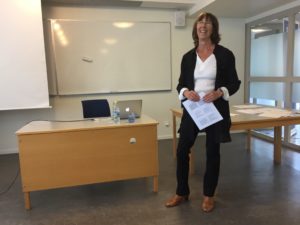 Today we had the pleasure of having Professor Ann Cunliffe giving a seminar on Publishing in top tier journals, specifically how to deal with reviewers’ comments. A number of different take aways but among those the Golden rule of writing: “Tell them what you are going to say—>TELL THEM—>Tell them what you have said”
Today we had the pleasure of having Professor Ann Cunliffe giving a seminar on Publishing in top tier journals, specifically how to deal with reviewers’ comments. A number of different take aways but among those the Golden rule of writing: “Tell them what you are going to say—>TELL THEM—>Tell them what you have said”
We will have the pleasure of enjoying Ann’s company and great mind for a week!
Markus presenting the Annals paper on extreme contexts at the R3 research seminar
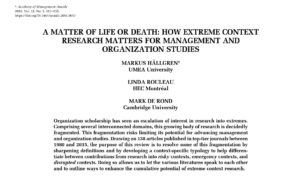 The R3 research group stands for Risk, Resilience and Reliability. It is a newly formed interdisciplinary network that currently is organized by Amy Fraher and Mark Hall at Birmingham University. Markus was invited to present his and Linda Rouleau´s and Mark de Rond´s Annals paper on extreme contexts. It was a great seminar with plenty of interesting thoughts and discussions following presentations by senior and junior scholars alike.
The R3 research group stands for Risk, Resilience and Reliability. It is a newly formed interdisciplinary network that currently is organized by Amy Fraher and Mark Hall at Birmingham University. Markus was invited to present his and Linda Rouleau´s and Mark de Rond´s Annals paper on extreme contexts. It was a great seminar with plenty of interesting thoughts and discussions following presentations by senior and junior scholars alike.
How to survive a zombie infection – and other minor disasters
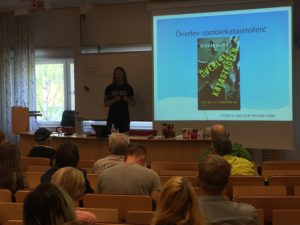 Today I, Markus, had the pleasure of listening to Herman Geijer. The expert on how to survive a zombie infection. Herman has written two books about the phenomena and now is giving talks all over Sweden about how to best prepare. It was a pleasure to listen to him, giving examples that are highly relevant to our behaviors and contemporary examples of disasters, such as 9-11, Hurricane Sandy, Forest fires in Sweden and bridges that breaks and people keep driving off from. I should nuance this slightly, Herman is indeed talking about zombies, but as a metaphor for understanding society´s preparedness level for more common disasters. From a extreme context point of view, it is yet an example of what we can learn when we apply such a empirical lens! Btw, the photo do not show it, but the room was packed!
Today I, Markus, had the pleasure of listening to Herman Geijer. The expert on how to survive a zombie infection. Herman has written two books about the phenomena and now is giving talks all over Sweden about how to best prepare. It was a pleasure to listen to him, giving examples that are highly relevant to our behaviors and contemporary examples of disasters, such as 9-11, Hurricane Sandy, Forest fires in Sweden and bridges that breaks and people keep driving off from. I should nuance this slightly, Herman is indeed talking about zombies, but as a metaphor for understanding society´s preparedness level for more common disasters. From a extreme context point of view, it is yet an example of what we can learn when we apply such a empirical lens! Btw, the photo do not show it, but the room was packed!
ODD seminar on Lauder & Marynissen – Normal chaos: A new research paradigm for understanding practice
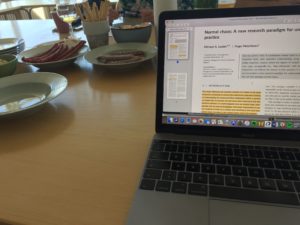 Yesterday Thomas arranged a seminar where we discussed Lauder & Marynissen´s article “Normal chaos: A new research paradigm for understanding practice” published in “Journal of Contingency and Crisis Management”. The conclusions were mixed but one take away is that what they describe is an old, universal problem. The battle between theory in use, and espoused theory if one will. The issue is what to do about this knowledge. That is yet to explore.
Yesterday Thomas arranged a seminar where we discussed Lauder & Marynissen´s article “Normal chaos: A new research paradigm for understanding practice” published in “Journal of Contingency and Crisis Management”. The conclusions were mixed but one take away is that what they describe is an old, universal problem. The battle between theory in use, and espoused theory if one will. The issue is what to do about this knowledge. That is yet to explore.
Research grant Stieg Larsson Foundation
 Oscar Rantatalo received a small research grant from Stieg Larsson Foundation (50 000 SEK) for complementary data collection on policing and criminal investigation of domestic violence in rural areas.
Oscar Rantatalo received a small research grant from Stieg Larsson Foundation (50 000 SEK) for complementary data collection on policing and criminal investigation of domestic violence in rural areas.
Professor Daniel Geiger´s workshop on Ethnographic methods is drawing a crowd!
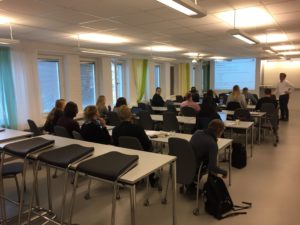
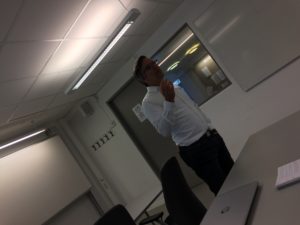 Professor Daniel Geiger was kind enough to give a workshop too about his view of ethnography and its practice. It was three hours really well spent on the challenges that faces anyone that is interested in such methods, summarized into collecting, analysing and writing up such data! Several good examples of his and others were provided as food for thought to the participants.
Professor Daniel Geiger was kind enough to give a workshop too about his view of ethnography and its practice. It was three hours really well spent on the challenges that faces anyone that is interested in such methods, summarized into collecting, analysing and writing up such data! Several good examples of his and others were provided as food for thought to the participants.
First grant received, Robert receives money from the Kempe foundation
A lot of exciting news now! Robert received his first grant from the Kempe foundation for going to a doctoral course in Lund on critical management. Congrats!